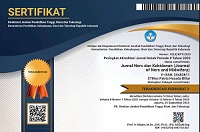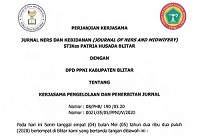Hubungan Berat Badan dan Kadar Kolesterol Darah Tikus Putih (Rattus Norvegicus) setelah diberikan Diet Tinggi Lemak
DOI:
https://doi.org/10.26699/jnk.v3i3.ART.p202-206Keywords:
Weight, Cholesterol, High-Fat Diet, RatsAbstract
Cholesterol is an essential substance for the body. The role of cholesterol as material hormones, cell membranare needed by the body. This conditionchanges into a distrubtion if the cholesterol levels in the blood increase. Weight becomes one of this trigger. The consumption of high-fat foods increase weight which resulting in the increase of cholesterol cases. The purpose of this study was to determine the level of correlations between weight and cholesterol levels after being given a high-fat diet.The study used rats (Rattus norvegicus) sex male, 16 rats with age between 1-2 months. Rats weight range between 100-150 gr and in healthy conditions. The giving of high-fat diet were in the form of chicken feed, duck eggs, goat oil, lard and flour for 8 weeks. The data measurement done by scales and measuringcholesterol levels through the end of the tail by means of easy touch. The data analysis were done to understand level of correlation between variables. The presentation of the data used tables. The results showed body weight of rats did not change after administration of a high-fat diet. The cholesterols levels of the subjects were high. Theadministration of high-fat diet from egg yolk dan goat oilcould increase the level of cholesterol. There was a correlation between weight and cholesterol levels after being given a high-fat diet (p <0.5). It was needed to repeatthe measurements to determine changes in cholesterol levels and other factors that affect thigh blood to cholesterol levels.References
Adachi, H., Hirai, Y., Satoshi, S., Enomoto, M., Fukami,
A., Kumaga, E., Esaki, E., & Imaizumi, T. 2011.
Trends in dietary intakes and serum cholesterol
levels over 50 Years in Tanushimaru in Japanese
Men. J Food Nutr Sci, 2, 476–481.
Faisal Baraas. 2003. Mencegah Serangan Penyakit
Jantung dengan menekan kolesterol. Jakarta:
Kardia Iqratama.
Jurnal Ners dan Kebidanan, Volume 3, Nomor 3, Desember 2016, hlm. 202–206
Davison, K.M., & Kaplan, B.J. 2012. Food intake and
blood cholesterol levels of community-based
adult with mood disorders. BMC psychiatry, 12,
Ecol , J. 2008. A Study of Correlation between Lipid
Profile and Body Mass Index (BMI) in Patients
with Diabetes Mellitus. http://www.krepublishers.
com/02-Journals/
Harini, M., D.A., Okid. 2009. Blood Cholesterol Level of
Hypercholesterolemia Rat (Rattus norvegicus)
After VCO Treatment. Journal Bioscience Vol 1
No 2 : 53-58.
Hosomi, R., Fukunaga, K., Arai, H., Kanda, S., Nishiyama,
T., & Yoshida, M. 2011. Effect of simultaneous
intake of fish protein and fish oil on cholesterol
metabolism in rats fed high-cholesterol diets. Open
Nutraceuticals J, 4, 12–19.
Kumar, V., Cottran, Ramzi, S., Robins, Stanley, L. 2007.
Buku Ajar Patologi Robbins, diterjemahkan oleh
Brahm U. Jakarta: Pendit, EGC.
Linawati, Sienny. 2011. Perbandingan Marker Inflamasi
Antara Sindroma Koroner Akut dan Non
Sindroma Koroner Akut. etd.ugm.ac.id/- index.
php?mod=download&sub.act.
Sirait, C.H. 1986. Telur dan Pengolahannya. Pusat
Penelitian Pengembangan Peternakan, Bogor.
Soeharto, I. 2004. Penyakit Jantung Koroner dan
serangan Jantung, Edisi kedua. Jakarta: PT
Gramedia Pustaka.
Tjahjono, K. 2000. Lipid digesti absorbsi dan
metabolisme, FK UNDIP.
World Health Organisation (WHO). 2008. Global Health
Observatory. http:// www.who.int/gho/ncd/risk_
factors/cholesterol_text/en/






